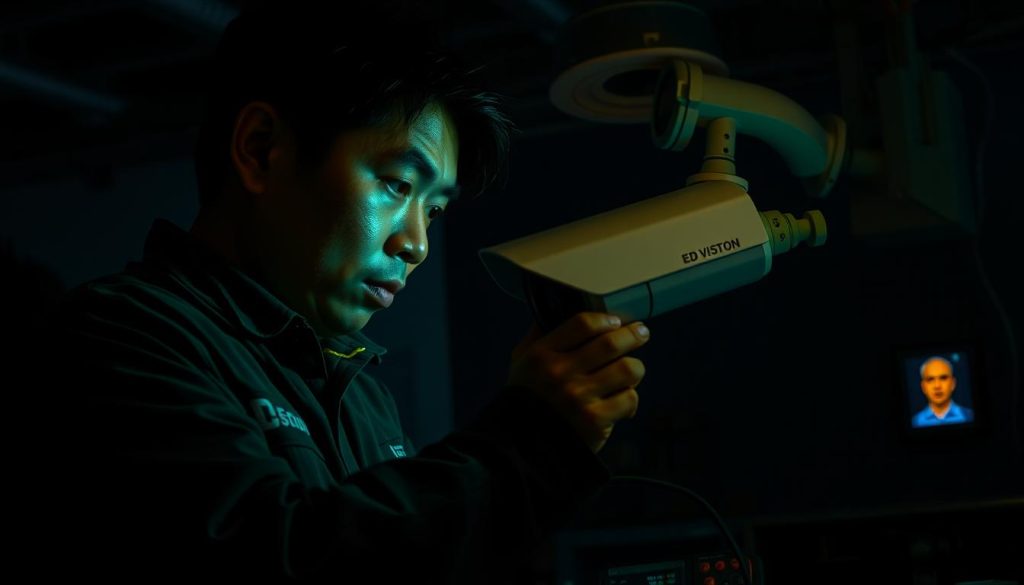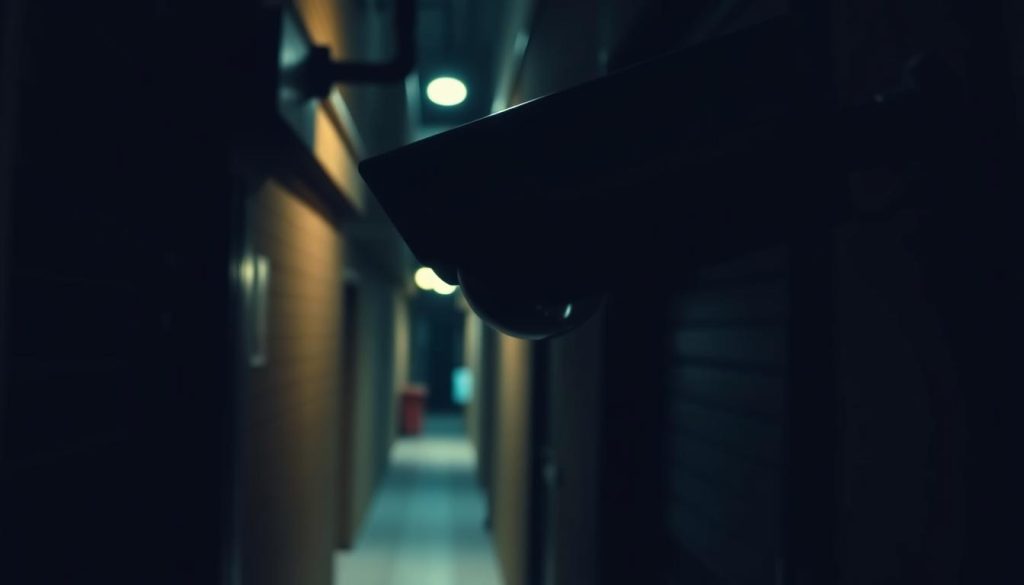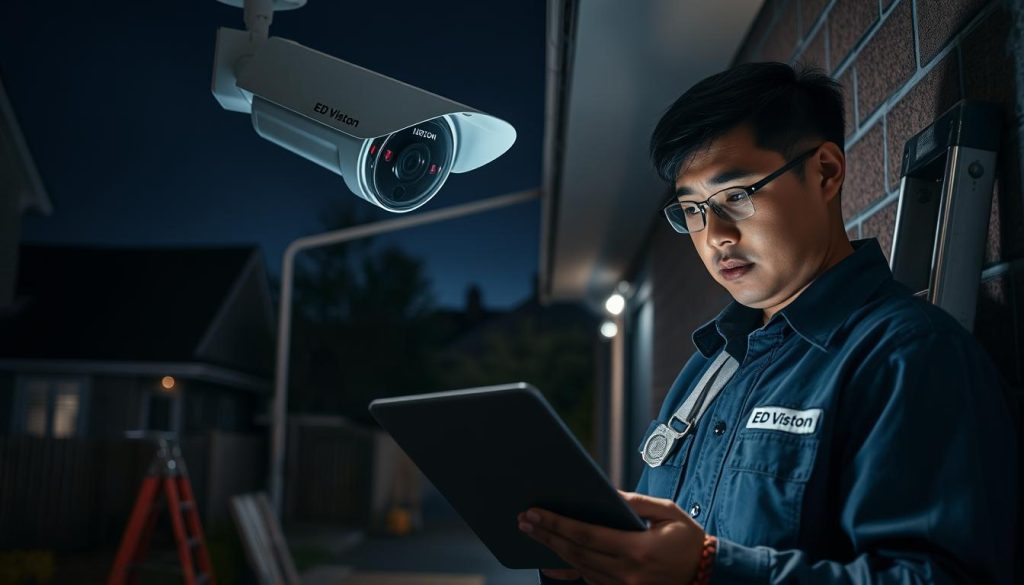Ever wondered why your CCTV system fails at night? It’s a common problem for those who rely on security cameras. We’ll explore the key issues with nighttime CCTV functionality. You’ll learn how to spot problems and fix them before they get worse.
Proper installation and setup are key to good surveillance. If your system doesn’t work at night, you’re not alone. Many people face the same issues.
Key Takeaways
- CCTV night vision issues are common and can stem from various factors.
- Voltage drop is a major contributor to nighttime camera malfunction.
- White screens may result from infrared light reflecting into the lens.
- Proper camera placement is critical for quality images at night.
- Regular maintenance can help solve nighttime performance problems.
- Weather and physical barriers can harm CCTV performance.
- Contact ED Viston at +65 8313 4578 for expert CCTV solutions and offers.
Common Symptoms of CCTV Night Vision Problems
CCTV night vision issues can be really frustrating, mainly when you need surveillance the most. Spotting these problems early can speed up fixing and get things working again. Nighttime affects how well these systems work, causing different problems.
Understanding the Impact of Nighttime Conditions
At night, the light around us gets much dimmer. This can really hurt how CCTV systems perform. Things like:
- Insufficient illumination: Cameras might find it hard to show clear images.
- Reflections: Lights nearby can cause glare.
- Power supply issues: Not enough power can make video disappear at night.
- Weak WiFi connections: Low bandwidth can cause video feeds to be shaky.
Knowing how nighttime affects CCTV systems helps in fixing problems. It lets users find out why things aren’t working right.
Identifying Signs of Malfunction
Some common signs of CCTV night vision issues include:
| Symptom | Possible Cause |
|---|---|
| Black screen at night | IR cut filter malfunction or not enough IR lighting |
| Blurry or distorted images | Camera placement or software issues |
| Loss of video feed | Wiring problems or power issues |
| Rolling lines on-screen | Ground loop interference affecting video quality |
Spotting these signs early can help fix problems fast. Getting help can be a big plus, for complex issues like hardware or software problems.
For specific advice on your CCTV system, reach out to ED Viston today at +65 8313 4578. Learn more about the latest CCTV solutions and deals.
Power Issues: Checking Your CCTV System
Power problems often cause CCTV night vision issues. If your CCTV night vision not clear or CCTV night vision not working, check the power supply. A thorough check can ensure your cameras work well at night.
Verifying Camera Power Supply
First, check the power supply for each camera. A big 78% of CCTV camera problems come from power issues. Make sure each camera gets the right voltage to avoid failures.
Power changes can also cause problems. When you’re troubleshooting, remember to:
- Check for any blown fuses or tripped circuit breakers.
- Inspect power adapters and transformers for damage.
- Consider using systems like PoE injectors that maintain consistent power delivery.
Examining Connections and Cables
Bad connections can cause big issues, even at night. About 65% of night malfunctions are due to power connections. Make sure all cables are tight and check for damage. 42% of camera failures are because of bad cables.
When you’re checking:
- Look for wear or frays in the cabling.
- Use strong cabling, like Cat 5 or Cat 6 Ethernet cables for best performance.
- Clean and adjust any connectors to improve signal quality.
By checking power sources and connections, you can solve many problems. If you’re stuck or want better solutions, call ED Viston at +65 8313 4578. They offer the latest CCTV tech to boost your security.
Infrared Lighting and Its Importance
Infrared lighting is key for CCTV systems, making night vision better. It uses LED lights to light up dark places, helping see clearly at night. Knowing how infrared works helps manage surveillance systems and fix issues like the CCTV night vision black screen.
How Infrared Technology Works
Infrared technology sends out light we can’t see. This light lets CCTV cameras work well in the dark. The cameras turn this infrared light into images we can see, helping us watch over areas at night.
Working infrared systems are important to avoid problems like the CCTV night vision black screen. This issue happens when there’s not enough infrared light or when it doesn’t work right.
Common Infrared Problems
There are several issues with infrared parts of CCTV systems, leading to poor night vision. These include:
- Not enough infrared light because of bad LEDs.
- Blocked infrared LEDs from dirt or camera problems.
- Power issues that affect LED work.
- Wrong camera settings that lower infrared sensitivity.
Regular checks and maintenance of infrared systems help find and fix these problems fast. Testing infrared parts helps avoid problems and fix CCTV night vision issues. Make sure cameras are right and lenses are clean to improve infrared performance.
If you want the best CCTV solutions, call ED Viston today at +65 8313 4578. Learn about new offers and boost your night surveillance.
Why is My CCTV Not Working at Night?
When your CCTV camera doesn’t work at night, it’s important to find out why. There are many reasons, like bad weather, wrong settings, or camera limits. Knowing these can help fix your security system.
Main Causes of Nighttime Functionality Issues
- Power Supply Problems: Not enough power is a big reason for camera failure at night. Check your power source, like PoE switches, if they’re under too much load.
- Improper NVR Settings: Wrong NVR settings can cause problems at night. Make sure your NVR is set to record all the time to avoid camera shutdowns.
- Infrared Lighting Issues: Make sure infrared lights are working right. If they’re not, your camera won’t see well at night.
- Environmental Factors: Things like shiny surfaces can mess with camera performance. Glass windows can also cause problems with reflections at night.
Steps to Diagnose the Problem
To fix your CCTV night vision, follow these steps:
- Check Power Supply:
- Look at the power load on your PoE switch to make sure it’s enough for all cameras.
- If power problems keep happening, try resetting the switch.
- Check your recording settings to make sure they work for 24/7 monitoring.
- Change settings if needed to help with night vision.
- Find any shiny surfaces or things blocking the camera’s view, which gets worse at night.
By fixing these main issues, you can make your CCTV work better at night. For expert help and the newest CCTV tech, call ED Viston at +65 8313 4578.

Voltage Drop: A Hidden Issue
Many users face voltage drop in CCTV systems, which hurts nighttime visibility. This happens when not enough power reaches the camera. It’s often due to long cables or bad wiring. Knowing how voltage drop affects CCTV systems is key to keeping them working well.
Understanding Voltage Drop in CCTV Systems
Voltage drop can really affect your CCTV setup. If cables are too long—usually over 100 to 150 feet—the wire’s resistance goes up. This means the camera doesn’t get enough power at night. Cameras might not work right, leading to poor or no footage.
It’s important to use high-quality cables that meet the right specs for video signal transmission.
How to Fix Voltage Drop Problems
There are a few ways to tackle voltage drop issues:
- Use thicker cables, like 12/2 or RG6, for longer distances to cut down on resistance.
- Make sure connections are tight, avoiding bad terminations like bent BNC connectors that can mess up the signal.
- Use power distribution boxes instead of just power strips for better stability.
- Plan your cable layout to keep runs as short as you can.
By following these tips, you can improve your CCTV system’s performance at night. Taking these steps will make your system more reliable and effective.
For more help with CCTV night vision issues, call ED Viston at +65 8313 4578. They offer the latest solutions and can tailor them to your specific needs.
| Camera Type | Power Requirement (V/A) | Power Usage (W) | Maximum Cable Length (ft) |
|---|---|---|---|
| Analog CM-HDA10W-DMA-SGS | 12V / 1.5A | 4W | 150 |
| Analog CM-HDA10W-BU-SGS | 12V / 1.5A | 4W | 150 |
Troubleshooting Image Quality Issues
Low-quality images at night can be a big problem. There are many reasons why CCTV night vision might not be clear, like blurring, distortion, or haze. Finding out why is key to getting good surveillance footage. Here, we’ll look at common problems and how to fix them, so your CCTV system works better.
Dealing with Blurred or Distorted Images
Many people have trouble with blurry images at night. This can happen for a few reasons, like:
- Dirty camera lenses, which really hurt image quality
- Long cable runs that can make the signal weak
- Not having infrared cut filters, leading to blurry night vision
- Cameras not placed right, causing distortion
To fix these issues, try these steps:
- Keep camera lenses clean for the best picture.
- Use shorter cables to avoid signal problems.
- Make sure cameras are set up right to avoid distortion.
Solutions for White Screen or Haze
A white screen or haze in your CCTV night vision can come from a few things, like:
- Big changes in brightness in the area being watched
- Flickering from fluorescent lights
- IR reflections from nearby objects or outside lights
Here are some ways to tackle these problems:
- Adjust the white balance to get colors right.
- Use the wide dynamic range feature to handle brightness.
- Move cameras to avoid IR reflections and haze.

If you’re having trouble with your CCTV night vision, getting help might be a good idea. Call ED Viston today at +65 8313 4578. They can help you find the best CCTV solutions and offers for better surveillance.
| Issue | Cause | Possible Solutions |
|---|---|---|
| Blurry Images | Dirty lenses, Signal degradation | Clean lenses, Shorten cable lengths |
| White Screen | Bright environment, Flickering lights | Adjust settings, Use WDR |
| Haze | IR reflections | Reposition cameras, Adjust focus |
| Distorted Images | Poor positioning | Reposition cameras, Check angle |
Camera Positioning and Placement
Good surveillance starts with the right camera placement. The correct angle ensures clear footage and avoids infrared issues. It’s key for CCTV night vision troubleshooting to check camera setup.
The Importance of Correct Camera Angling
Getting the camera angle right is vital for clear night shots. Install cameras 8 to 10 feet up for better coverage and to prevent tampering. This height helps overcome environmental challenges.
Most burglars enter through the front door, so cameras must cover these spots well. Avoiding glare from lights or windows is also important for quality video.
Adjusting to Reduce Infrared Reflection
Infrared reflection can mess up night surveillance. Nearby reflective surfaces can harm IR camera performance. Adjusting camera placement helps avoid these problems.
Features like Wide Dynamic Range (WDR) improve video quality in different lights. This careful planning is vital for top-notch security.
For more on advanced camera features, check out Wenhong. Their IP CCTV systems offer high-definition video and reliable performance. Call ED Viston at +65 8313 4578 for the latest CCTV solutions and deals.
Environmental Factors Affecting CCTV Performance
Weather, lighting, and physical barriers can greatly affect CCTV systems at night. It’s important to know how these elements impact video quality. Understanding these factors is the first step to fixing CCTV night vision issues.
The Role of Weather Conditions
Weather is a big factor in CCTV system performance. Rain, fog, or strong winds can block visibility, leading to poor video quality. When it’s hard to see, cameras have trouble capturing clear images, which is bad for nighttime surveillance.
Outdoor installations can also face temperature-related reliability problems. It’s key to monitor and adjust settings based on weather changes to improve performance.
Investigating Physical Obstructions
Physical barriers around CCTV cameras can really hurt their performance. Trees, buildings, or cameras not set up right can block views and prevent good footage. Also, light pollution can make images unclear.
It’s important to check your surveillance setup often and move cameras as needed. Keeping cameras clean is also vital to avoid dirt and debris blocking the view.
| Environmental Factor | Potential Issues | Recommended Solutions |
|---|---|---|
| Rain or Fog | Poor visibility, reduced image quality | Install water-resistant cameras; enhance infrared lighting |
| External Light Pollution | Overexposed images | Adjust camera settings; use shade structures |
| Physical Obstructions | Blocked view, incomplete footage | Regularly check surroundings; reposition cameras |
| Temperature Changes | Electrical conductivity issues | Consider climate-proof installations and regular inspections |
Improving CCTV performance and fixing night vision issues starts with understanding environmental factors. For more help, contact ED Viston today at +65 8313 4578. They offer the latest CCTV solutions and tailored security needs.
Upgrading CCTV Systems for Better Night Vision
Technology keeps getting better, and many find their old CCTV systems don’t cut it for night vision. Upgrading to newer models can really boost your surveillance game. The latest cameras use advanced sensors to improve night vision, working great even in the dark.
Modern Solutions with Enhanced Features
Today’s CCTV systems have cool new features to help with night vision. Here are some key ones to look at:
- Improved infrared lights: These lights light up dark spots without using too much energy, giving off lots of light.
- Higher resolution capabilities: Better resolution means clearer images, even when it’s really dark.
- User-friendly interfaces: Easy controls make adjusting settings a breeze, making the system easier to use.
Considerations for Purchasing New Equipment
When you’re looking for new CCTV gear, a few things matter a lot for night vision:
| Feature | Importance |
|---|---|
| Resolution | Higher resolutions mean sharper images, which is key in low light. |
| IR Range | A bigger IR range lets you see more clearly at night over bigger areas. |
| Camera Type | Pick between dome, bullet, or PTZ cameras based on what you need to watch. |
| Lens Quality | Good lenses cut down on glare and reflections, helping your nighttime footage stay clear. |
Regular upkeep, like cleaning and updating software, can also make your night vision better. Managing things like reflections can help too. For even more visibility at night, think about adding LED lights.
Need help upgrading your CCTV system? Call ED Viston at +65 8313 4578 for advice on the latest CCTV tech and deals.
General Maintenance Tips for CCTV Systems
Keeping your CCTV system in good shape is key for it to work well, even at night. Regular care helps your equipment last longer and improves night vision. Make sure to check and clean your system often.
Importance of Regular Inspections
Regular checks are important to spot problems early. They help avoid big issues by checking power, cables, and camera work. This keeps your cameras running smoothly, which is vital at night.
By being proactive, you avoid headaches and keep your security system strong.
Cleaning the Cameras and Lenses
Cleaning your CCTV cameras and lenses is a must for clear images at night. Dirt can really hurt how well they work. Set a cleaning schedule to keep everything sharp.
Also, check the infrared LEDs to make sure they’re working right. They’re key for seeing in the dark. For better surveillance, look into Vehicle License Plate Cameras. Learn more here about how they can help.
Call ED Viston at +65 8313 4578 to discover the latest in CCTV tech. They have solutions to keep your place safe.
Conclusion
Knowing why your CCTV isn’t working at night is key for good surveillance and security. Troubleshooting can solve many issues, like power problems, connection issues, and environmental factors. Regular checks and updates are also important for your systems to work well.
Dealing with nighttime video loss or night vision malfunctions? Getting expert advice can help a lot. Choosing top-notch cameras, like those from Reolink, can help avoid these problems. Models like the Reolink Altas PT Ultra or Reolink RLC-811A improve your night vision.
Want to fix your CCTV night vision issues and learn about new security options? Call ED Viston today at +65 8313 4578. Our team is here to help with solutions that meet your needs. We aim to keep you safe, day and night.
FAQ
Why is my CCTV not working at night?
What are common symptoms of CCTV night vision problems?
How can I troubleshoot CCTV night vision issues?
What should I check if my CCTV night vision is not clear?
What causes a black screen in my CCTV night vision?
How do I improve my CCTV’s night vision performance?
What effect does voltage drop have on CCTV night vision?
How often should I maintain my CCTV system?
Can weather conditions affect my CCTV night vision?
What are the signs that I may need to upgrade my CCTV system?
Source Links
- https://www.cctv42.co.uk/help-advice/faqs/i-m-having-problems-with-my-cctv-camera-when-filming-at-night/
- https://network-data-cabling.co.uk/blog/12-cctv-problems-and-fixes/
- https://reolink.com/blog/video-loss-on-security-camera/?srsltid=AfmBOorU3qWGTX3ZsS-q0FpYaFlCsXYPpgG4_u9nAoxmCgQDVK1fyUsM
- https://reolink.com/blog/security-camera-picture-problems-and-solutions/?srsltid=AfmBOopFrbGQp-pR30NUgDpBOgUDC4pT0V1dXMbqXgwOyk0Myhg0BOl6
- https://cctvcameravision.com/10-steps-to-check-if-your-cctv-camera-is-working/
- https://reolink.com/blog/security-camera-wont-work/?srsltid=AfmBOop465OCMMt44L4TeztKn9PF3kBvdXVQvUaUCB7w-M41zEaha7HY
- https://cctvcameravision.com/how-to-fix-infrared-not-working-on-your-security-camera/
- https://trassir.com/articles/troubleshooting-nighttime-flickering-understanding-your-security-camera-issues/
- https://community.spiceworks.com/t/ip-cameras-comes-on-during-the-day-and-goes-off-at-night/753621
- https://reolink.com/blog/video-loss-on-security-camera/?srsltid=AfmBOoocCNKU_m6L3qscH4nSF8HUgshRMCcv8fCyMQ5Mj3cE3gVroVQY
- https://www.cctvforum.com/topic/50912-installation-questions-mostly-stemming-from-voltage-concerns/
- https://www.securitycameraking.com/securityinfo/how-to-troubleshoot-analog-security-cameras/?srsltid=AfmBOoqxhgJK08SixI51x15QdSq7AqyjmWSP85TvxlwFOQw4885RwLw9
- https://ipvm.com/discussions/analog-camera-video-signal-cutting-in-an-out-any-ideas
- https://reolink.com/blog/security-camera-picture-problems-and-solutions/?srsltid=AfmBOoobqBrmy2JJUH70UP-3TwFKBpoCVN29aE_ubKTGdWSDD-Z0yHTt
- https://help.axis.com/en-us/troubleshooting-image-quality
- https://solink.com/resources/industry-insights/why-is-cctv-quality-so-bad/
- https://www.security.org/security-cameras/placement-guide/
- https://www.bossecurity.com/2024/05/04/optimizing-your-security-strategic-placement-of-security-cameras/
- https://www.nmcabling.co.uk/2023/02/common-cctv-problems-and-how-to-solve-them/
- https://reolink.com/blog/video-loss-on-security-camera/?srsltid=AfmBOooEtZcK51DJrja9UoIRBj0pM2Kh4a9sXrMsMG_zQLkDMMXIQG55
- https://reolink.com/blog/security-camera-picture-problems-and-solutions/?srsltid=AfmBOop5qEOicBbBAavUMmafPW-g3pDRwBq9Go0uRBXNib5xVVebgEPD
- https://forum.yitechnology.com/t/night-vision-not-working/6480
- https://edgebusinesssecuritycameras.com/5-easy-tips-to-improve-security-camera-night-vision
- https://www.caughtoncamera.net/news/common-cctv-problems-fix/
- https://cctvcameravision.com/fixing-your-cctv-camera-not-working-at-night/
- https://datamyte.com/blogs/cctv-maintenance/
- https://reolink.com/blog/security-camera-wont-work/?srsltid=AfmBOor_XobgDDzUpafDVrYS074H4lRsUXx518rFSGqMSYU51IB5o1-c
- https://reolink.com/blog/video-loss-on-security-camera/?srsltid=AfmBOoq45S52u6zycOzDownznhpSjMAGf3SEWS_mY5TjfXgI4cZ-hZyX

